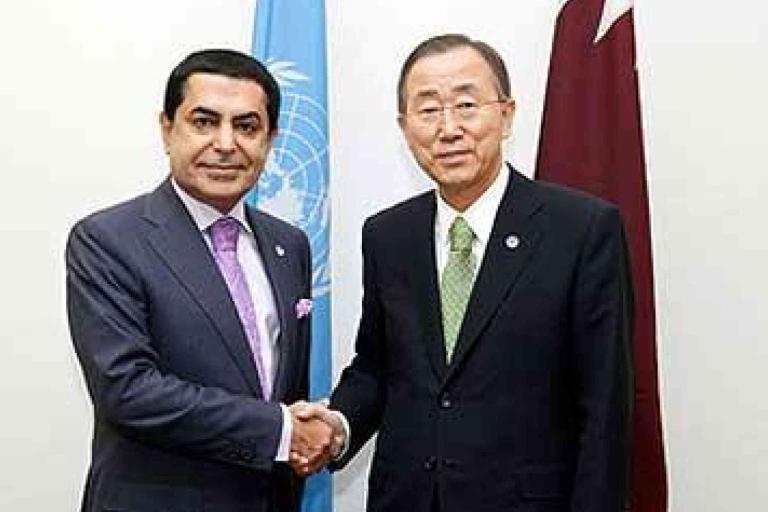UN Secretary-General, Assembly President, highlight disaster prevention as key 2012 priority

Geneva, 5 January 2012 - UN Secretary-General, Ban Ki-moon, in a recent interview, highlighted the prevention of disasters and making the world safer among his “five generational priorities” for his second term which began on Sunday.
Mr. Ban also identified promoting sustainable development; helping countries and peoples in transition; and encouraging gender empowerment.
“We have to connect the dots [between] climate change, [the] food crisis, water scarcity, energy shortages and women’s empowerment as well as global health issues. These are all interconnected issues.”
Mr. Ban said solutions lie with harnessing “the strong power of partnerships” to respond to the planet’s biggest challenges, such as tackling climate change, combating poverty and empowering women and girls.
“Together, nothing is impossible,” said the Secretary-General, adding that “if we strengthen these partnerships among governments, business communities, civil organizations and philanthropists, then I think all these powerful partnerships can bring us towards the right direction.”
The Secretary-General cited his meeting with a boy during a visit last year to the South Pacific island country of Kiribati which, threatened by rising sea waters – as an example of the enormous faith and expectations which the peoples of the world invest in the UN. “He appealed to me to ‘Please help us address this climate change. Our homes and our way of life may be swept away overnight’,” Mr. Ban recalled, saying it is one of the reasons why climate change must remain at the top of the global agenda.
Disaster preparedness was again a key priority among three others identified by Nassir Abdulaziz Al-Nasser, President of the 66th Session of United Nations General Assembly in his end of the year address to usher in 2012.
Al-Nasser said that in 2011, the Great East Japan Earthquake, floods in Southeast Asia, and the crisis in the Horn of Africa, had tasked the international community to intensify efforts to improve disaster preparedness – the third pillar of the Assembly’s 66th session.
“Though much has been done to share lessons and improve systems of alert and quick response around the world, we must do more to implement policies and measures that can mitigate the impact of natural disasters and also address or prevent man-made catastrophes”, he said.
On sustainable development and global prosperity, the fourth pillar, Al-Nasser said, “We must work on implementing measures that deal effectively with the urgent social, economic and environmental challenges of our time. In this regard, the UN Conference on Sustainable Development (Rio+20) in June 2012 is going to be an important international forum where the collective will of Member States can be readily applied in finding lasting solutions to some of the development challenges facing the world.”
The other two pillars of the current session of the Assembly are mediation in the peaceful settlement of disputes, especially in the Middle East, and UN reform and revitalization.
“I urge all Member States to continue to support the work of the United Nations, including the General Assembly, especially with renewed efforts around the four key pillars”, stated Al-Nasser.
- WMO Member:
- Japan

